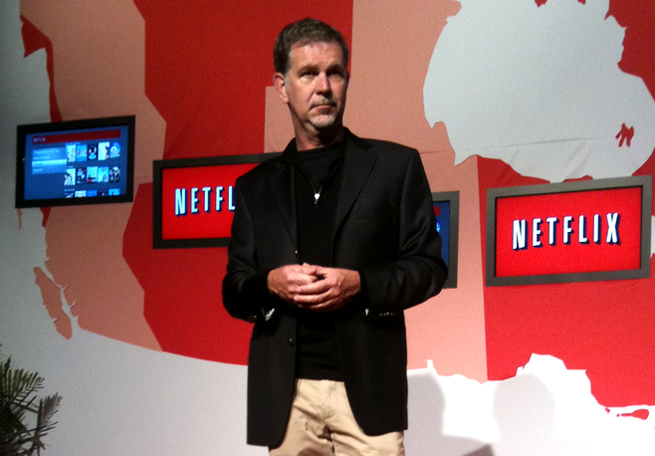While it seems fairly obvious that corporations would use social media to communicate to the public, the U.S. Securities and Exchange Commission has formally decided it’s OK, according to a new filing today that involves Netflix’s charismatic chief executive, Reed Hastings.
[aditude-amp id="flyingcarpet" targeting='{"env":"staging","page_type":"article","post_id":709562,"post_type":"story","post_chan":"none","tags":null,"ai":false,"category":"none","all_categories":"business,media,social,","session":"B"}']Back in December, SEC staff recommended that Hastings and Netflix be formally charged with failing to use proper disclosure procedure when he shared news on Facebook in June. Hastings was sharing news that Netflix’s subscribers had reached 1 billion hours of video watched on the streaming service for the month, which coincided with a boost to the company’s stock.
The SEC’s new decision allows CEOs to tweet, update Facebook, and other social networks, just so long as the information follows other disclosure policy. That means Hastings isn’t going to get in trouble for the Facebook incident he invoked last year. (Now, all other CEO of major companies need to do is just find the time to update their accounts more often.)
AI Weekly
The must-read newsletter for AI and Big Data industry written by Khari Johnson, Kyle Wiggers, and Seth Colaner.
Included with VentureBeat Insider and VentureBeat VIP memberships.
Here’s the SEC’s official statement about its decision on social media:
The Securities and Exchange Commission today issued a report that makes clear that companies can use social media outlets like Facebook and Twitter to announce key information in compliance with Regulation Fair Disclosure (Regulation FD) so long as investors have been alerted about which social media will be used to disseminate such information.
The SEC’s report of investigation confirms that Regulation FD applies to social media and other emerging means of communication used by public companies the same way it applies to company websites. The SEC issued guidance in 2008 clarifying that websites can serve as an effective means for disseminating information to investors if they’ve been made aware that’s where to look for it. Today’s report clarifies that company communications made through social media channels could constitute selective disclosures and, therefore, require careful Regulation FD analysis.
“One set of shareholders should not be able to get a jump on other shareholders just because the company is selectively disclosing important information,” said George Canellos, Acting Director of the SEC’s Division of Enforcement. “Most social media are perfectly suitable methods for communicating with investors, but not if the access is restricted or if investors don’t know that’s where they need to turn to get the latest news.”
Source: WSJ; Photo via blucier/Flickr
VentureBeat's mission is to be a digital town square for technical decision-makers to gain knowledge about transformative enterprise technology and transact. Learn More

